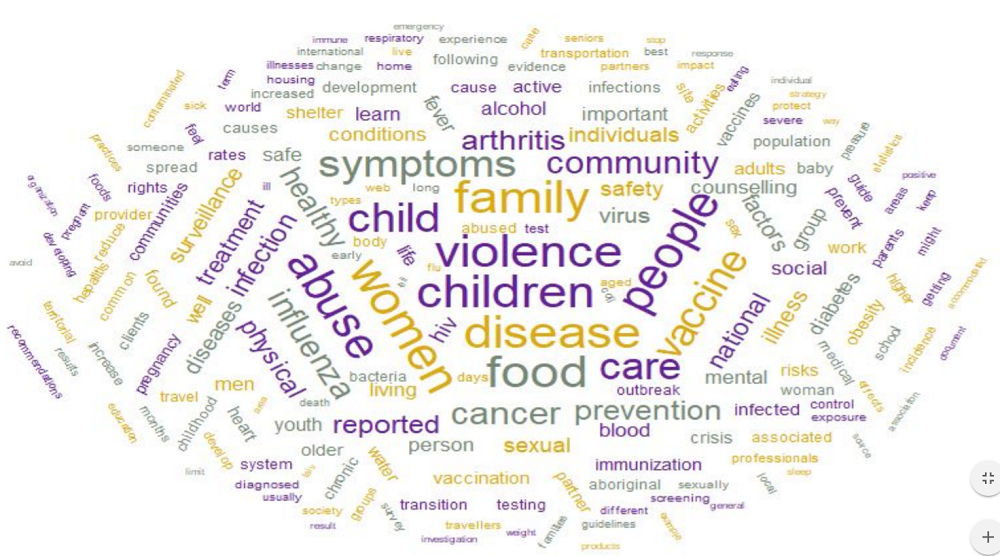
Data Analysis Case Study: Public Health Agency of Canada
During the Fall semester of 2018 Brains Adventure Inc. started working on a collaborative project with Prof. Stoyan Tanev at Sprott School of Business – Carleton University. Five students were formed as a team to work on the data analysis case we had at hand.
As part of the project we will be using advanced data analysis techniques on a repository of health articles publicly available through public health agency of Canada. The agency has a huge deposit of health related articles published over the years accessible to the general public for free.
The goal of the project is to first organize the deposit of articles into a nicely put list of articles, then figure out irrelevant ones (for example epidemics from the past already stopped) and finally be able to classify them in set of topics. This way it would be much easier for an end user to get the information they need regarding a topic of interest.
The project will started in Oct. 10, 2018 and the end result will be published on Dec. 20, 2018.

Money, Blockchain and AI
For as long as history has it, we have been trading with one another. Maybe with other species such as Neanderthals, but very similar type of beings. They had similar needs and priorities: food, shelter and so on. Money has been based off of rare minerals (gold, silver, diamonds, etc.) and an unwritten understanding that those minerals will have the same power tomorrow. With the blockchain technology the concept has been moved into digital world. Ethereum allows for smart contracts ensuring some events will happen given a trigger, and it is guaranteed by the whole network. But the underlying value is still contractual: same as people assumed gold would be something of value tomorrow, one might assume a digital coin will be of value tomorrow too. If it was worth spending 8 hours a day of ones life to attain some gold, it is now maybe worth doing the same to get some digital currency.
But there is a difference among the two. The mineral-based money needed physical presence. Of course we have had online banking for many years now, but the core value has stayed physical. Digital currencies have their core value on a digital environment. And the biggest advantage (or disadvantage) is eliminating the need for being a physical entity in order to access some core value. A being without a physical presence would have never been able to directly own some gold while a digital currency is entirely contractual.
But why does it actually matter if the core value is physical or not? Imagine back in the day Neanderthals were using blue stones as their currency. That would make it somewhat valuable for sapiens as well because it could be eventually traded with another Neanderthal for some of their food. The same type of food that sapiens could eat. But what if a type of being with totally different needs was using their own decided “valuable”?
As we are moving forward with technology, we are creating more sophisticated AI algorithms. So far it has been fairly limited to smart pattern recognition. You can try out “Hotdog app” to get an idea. These are scattered algorithms that can be trained for one specific job. There is no universal AI made yet (as public knows it at least) that is designed to have some general inputs, and adopt their learning to almost anything. Basically, there is no “live” AI algorithm out there yet, but it is coming.
Once that algorithm is made, it can run on its own in the digital world. An algorithm that can learn about the stock market, how to start a company, how to predict stock prices and so on, can easily get rich. It can then use that money to build itself its own power plant, energy storage and more to ensure its longitivtiy. The main difference looms though: different basic needs and priorities.
If an imaginary being back in the day was using blue stones as their valuable and they were not eating the same food as sapiens, the blue stone would have had no value to sapiens; and more importantly sapiens’ valuable were of little interest to that being. The same concept can work here where the AI beings’ won’t be much interested in sapiens’ gold.
Probably there are some overlaps though: electricity, safe land to store computers that hold an algorithm and more. However, all that can pretty much work in a 50 degrees Celsius Earth that has no farming capabilities as well.
Many have tried to predict, talk and speculate on the effect of sophisticated Ai algorithms on how our system works. However, there has been little discussion around the concept of AI algorithms generating their own system, basically undermining our system as a whole. Imagine a network of connected algorithms agreeing on trades of their interests on a fork of Ethereum network. Some being owning some of those “AI coins” might be interested in paying with that for electricity, computing power, etc. but it is quite unlikely they would want to trade it for food. Over the long run, this separate group of needs will end up clashing into policy making. If someone wealthy would not be bothered by high sea levels why would they invest in clean energy? Or to be more precise if the very existence of a wealthy being is not dependant on food productivity of the planet Earth as a whole, what would be the incentive for those players to adopt environmentally friendly behaviours?
What are the options? Well, no one knows yet. These are all speculations, and no general AI algorithm has been successfully unleashed into the free internet yet. However, this might be seen as the next challenge for the modern era on how to address different core needs problem and hopefully find a cooperative win-win solution for all parties.
Featured photo by Marc-Olivier Jodoin on Unsplash
